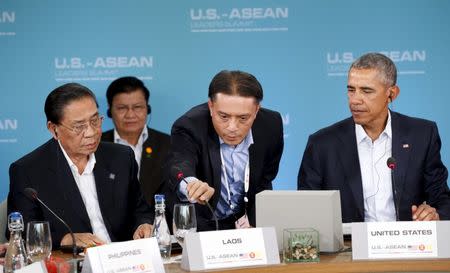Obama, Southeast Asia leaders eye China and trade at California summit
By Jeff Mason RANCHO MIRAGE, Calif. (Reuters) - President Barack Obama and leaders from Southeast Asia gathered on Monday for a summit aimed at boosting trade and creating a common stance on the South China Sea in a gathering the White House hopes will solidify U.S. influence in the region. Obama will discuss efforts to curb North Korea and to fight Islamic State militants during the two-day summit with Association of Southeast Asian Nations (ASEAN) at Sunnylands, a California resort. The meeting, at the same location where Obama once hosted Chinese President Xi Jinping, is designed to demonstrate Washington's commitment both as a counterweight to Beijing and as an eager trading partner with ASEAN nations. It also helps cement a legacy issue for Obama, who has championed a trade and foreign policy pivot to Asia during his presidency and is determined to present the United States as a Pacific power. “The Asia Pacific region is increasingly the world’s political and economic center of gravity,” White House National Security Adviser Susan Rice told reporters on Monday, noting that U.S. companies have more than doubled investment in the region since 2008. China's role in the region hung over the meeting. Rice said she expected China would support new international sanctions on North Korea for its recent rocket launches. Goals of the two-day gathering include increasing commercial ties, which will be underscored by the presence of several U.S. corporate executives; cooperating on counter-terrorism; and setting principles for maritime security in the region, the White House said. The first day of the summit was scheduled to focus on economic issues and trade, including discussion of the Trans-Pacific Partnership deal, which includes four ASEAN members: Vietnam, Singapore, Brunei and Malaysia. Others are interested in joining, and the White House wants to make sure the pact takes effect. On Tuesday, the leaders will discuss maritime issues, including the South China Sea, where China and several Southeast Asian states have conflicting and overlapping claims. White House officials have said Obama would deliver a tough message to China that disputes over the area must be resolved peacefully and not by bullying. “I’m ... confident that our shared commitment to upholding these norms will be reinforced," Rice said. The challenge at the summit may be to get all ASEAN countries to agree on a strong statement on the issue. Officials say China has put pressure on countries such as Cambodia and Laos not to sign on. Encouragement from Obama, and a message that the United States will continue to engage with the group, may counteract that. "If the ASEAN leaders feel that the United States is investing in ASEAN ... that would encourage even the weakest, the most susceptible ASEAN states to sign on with their brothers to make these statements," said Ernest Bower, an Asia expert at the Center for Strategic and International Studies. "No one in Southeast Asia wants the Chinese to run roughshod over their smaller neighbors." (Additional reporting by Roberta Rampton and David Brunnstrom in Washington; Editing by Dan Grebler)

 Yahoo News
Yahoo News 



